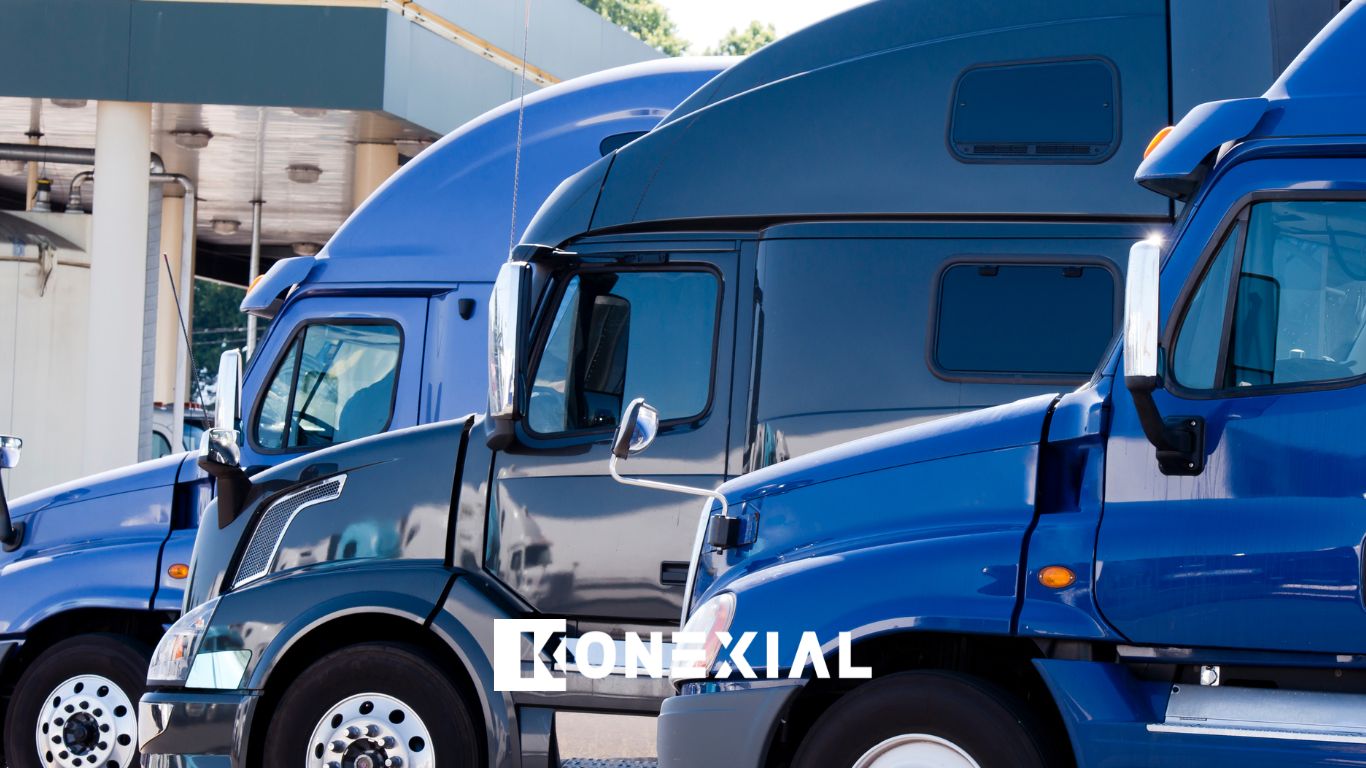Why Fleet Management Technology is Essential for Your Business

Why Fleet Management Technology is Essential for Your Business
Fleet management technology is a must for modern businesses. As the need for efficiency grows and more businesses turn to ground transport, it’s more important than ever before to ensure your fleet is optimized.
Fortunately, fleet management technology offers businesses a streamlined approach to their operations while maintaining a focus on safety. Dive into the evolution of fleet management and explore the advantages of smart fleet management technology to position your business for success.
What is Does a Fleet Management Do?
Fleet management often refers to the comprehensive administration of a company’s vehicles. It includes various tasks, such as vehicle acquisition, maintenance, telematics, driver management, route planning, fuel management, and compliance with FMCSA regulatory requirements. A fleet manager’s primary job is to optimize the use of vehicles, improve efficiency, reduce costs, enhance safety, and ensure that vehicles are in compliance with relevant regulations.
Fleet management is essential for businesses that rely on a fleet of vehicles to carry out their operations. The most commonly know industry using fleet management solutions is the trucking, transportation and logistics companies however there are several other industries that rely on and thoroughly benefit from fleet management software. In essence, any business or organization that operates a fleet of vehicles can benefit from fleet management to improve operational efficiency, reduce costs, and ensure the safety of their drivers and the public.
The Evolution of Fleet Management
Fleet management has come a long way since its inception. In the past, managing a fleet of vehicles primarily involved manual processes, relying on paper records and human effort. Businesses struggled to keep track of their vehicles’ whereabouts, maintenance needs, and driver behavior. This often led to inefficiencies, higher operational costs, and a lack of real-time or live visibility into fleet operations.
In recent decades, fleet management has experienced a significant transformation, largely driven by technological advancements. The integration of GPS (Global Positioning System), vehicle telematics, and IoT (Internet of Things) devices into vehicles and fleet management software has revolutionized the industry. These technologies have enabled real-time tracking, data collection, and analysis, providing fleet managers with invaluable insights to make informed decisions.
One of the most substantial changes in fleet management is the shift from manual processes to automated systems. Modern fleet manager systems offer automation for various tasks, including violation notifications, route planning, maintenance scheduling, and even data entry. This shift reduces the potential for human error, enhances operational efficiency, and cuts costs by optimizing resources.
Why Is Fleet Management Important?
Fleet management is crucial within the trucking industry as it ensures the efficient utilization of resources, reduces operational costs, and enhances safety. With fleet management technology, trucking companies can maximize their fleet’s productivity, ultimately leading to increased profitability. Additionally, it plays a pivotal role in monitoring driver behavior and compliance, mitigating risks, and improving the industry’s overall safety standards. Here are the top four reasons why fleet management is critical within the trucking and transportation industry.
- Increase Efficiency: It streamlines operations, optimizing routes, reducing fuel consumption, and extending the lifespan of vehicles, which leads to cost savings and improved efficiency.
- Improve Safety: By monitoring driver behavior and vehicle health, fleet management technology enhances safety, reducing accidents and minimizing risks.
- Reduce Costs: Efficient fleet management can significantly reduce operational expenses, making it a cost-effective investment for businesses.
- Live Monitoring: Real-time visibility into the fleet’s location and status allows for better tracking of deliveries, rapid response to emergencies, and keeping customers informed.
What is Fleet Management Technology?
Fleet management technology encompasses a set of crucial components that drive its effectiveness. These include GPS and Telematics, offering live visibility and tracking with insights into driver behavior. The Fleet Manager’s software paired with edge computing hardware serves as the technology’s core, enabling route planning, maintenance scheduling, and reporting. Internet of Things (IoT) devices integrated into vehicles collect data on vehicle health, fuel consumption, and driver performance. Driver management tools help monitor and ensure driver safety and policy compliance, while reporting and analytics features empower fleet managers with data-driven insights and regulatory compliance capabilities. These types of elements collectively form the foundation of a robust fleet management system.
Essential Components of Fleet Management Technology:
Fleet management technology offers businesses a streamlined approach to their operations while maintaining a focus on safety. There are several essential elements that make fleet management technology so valuable here are the top six components that fleet managers rely on on a daily basis.
- GPS and Telematics: These technologies provide real-time tracking and data collection, allowing fleet managers to monitor the location, speed, and routes of their vehicles. Telematics also provide insights into driver behavior and vehicle diagnostics.
- Fleet Manager System: The core of fleet management technology, this software platform offers tools for monitoring and controlling the fleet. It helps with tasks such as route planning, maintenance scheduling, and reporting.
- IoT Devices: Internet of Things (IoT) devices and sensors, when integrated into vehicles, collect data on vehicle health, fuel consumption, and driver performance.
- Automated Systems: Automation streamlines processes like route optimization, maintenance reminders, and fuel management, reducing human error and enhancing efficiency.
- Driver Management Tools: These tools assist in monitoring and assessing driver behavior, ensuring safety and compliance with company policies.
- Reporting and Analytics: Fleet management technology provides data analysis and reporting features, helping fleet managers make data-driven decisions and meet regulatory requirements.
Key Benefits of Using Fleet Management Technology
The adoption of fleet management technology offers a multitude of key benefits for businesses relying on the transportation of products and goods via vehicle fleets. Firstly, it enhances operational efficiency by providing real-time tracking, automated route optimization, and maintenance scheduling, resulting in significant cost savings. Utilizing a fleet solution with driver safety scorecards, fleet safety is can be greatly improved through driver behavior monitoring, which reduces the risk of accidents and associated costs. Fleet management technology also allows for better control of fuel consumption, thereby contributing to cost reduction and environmental responsibility. Real-time monitoring of the fleet’s location and status ensures timely deliveries, fosters customer and shipper satisfaction, and allows for swift responses to emergencies. Ultimately, by promoting sustainability and simplifying regulatory compliance, fleet management technology has become an indispensable tool for transportation businesses across various industries.
Choosing the Right Fleet Management System for Your Business
Selecting the best fleet management software requires a careful evaluation of your unique business requirements and finding a system that offers the necessary features, scalability, and support. It’s a decision that can significantly impact your operational efficiency, safety, and overall cost savings.
How to Choose the Best Fleet Management Software for Your Business:
-
- Assess Your Needs: Identify your specific needs and goals. Consider the size of your fleet, industry requirements, and any regulatory compliance issues.
- Research and Compare: Research various fleet management software providers, comparing their features, pricing, and customer reviews.
- Request Demos: Arrange for demonstrations of the software to evaluate its usability and see if it aligns with your business goals.
- Consider Integration: Ensure the software can seamlessly integrate with your existing systems, such as your ERP or TMS software.
- Scalability: Choose a system that can grow with your business, accommodating both your current and future needs.
- Evaluate Support: Assess the quality of customer support and responsiveness of the provider.
- Total Cost of Ownership (TCO): Consider not only the upfront cost but also ongoing fees, maintenance, and potential cost savings from the system’s efficiency.
- User Training: Determine if training is provided and if it suits your team’s needs.
- Assess Your Needs: Identify your specific needs and goals. Consider the size of your fleet, industry requirements, and any regulatory compliance issues.
- Research and Compare: Research various fleet management software providers, comparing their features, pricing, and customer reviews.
- Request Demos: Arrange for demonstrations of the software to evaluate its usability and see if it aligns with your business goals.
- Consider Integration: Ensure the software can seamlessly integrate with your existing systems, such as your ERP or TMS software.
- Scalability: Choose a system that can grow with your business, accommodating both your current and future needs.
- Evaluate Support: Assess the quality of customer support and responsiveness of the provider.
- Total Cost of Ownership (TCO): Consider not only the upfront cost but also ongoing fees, maintenance, and potential cost savings from the system’s efficiency.
- User Training: Determine if training is provided and if it suits your team’s needs.
In conclusion, fleet management technology has evolved into an indispensable tool for the trucking, transportation and supply chain industries. The comprehensive features, including real-time tracking, driver behavior monitoring, and automated systems, have revolutionized the way companies operate their vehicle fleets.
Whether you’re a transportation company, a service provider, or part of the public sector, choosing the right fleet management system can significantly enhance your vehicle operations and ensure your business’s success in today’s competitive landscape.
Learn more about our fleet management technology solutions today!







